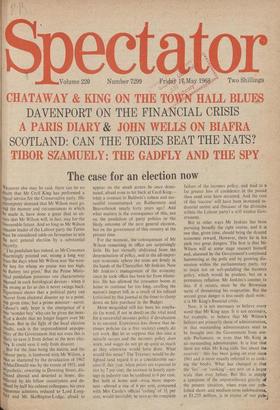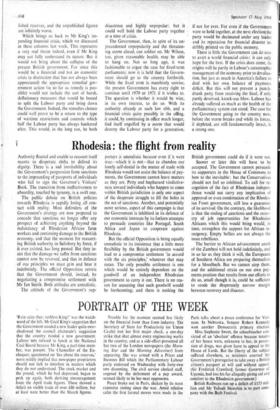The case for an election now
Whatever else may be said, there can be no doubt that Mr Cecil King has performed a signal service for the Conservative party. His Peremptory demand that Mr Wilson must go, and the manner and circumstances in which he made it, have done a great deal to en- sure that Mr Wilson will, in fact, stay for the foreseeable future. And so long as Mr Wilson remains leader of the Labour party the Tories must be considered odds-on favourites to win the next general election. by a substantial majority.
The pendulum has indeed, as Mr Crossman disarmingly pointed out, swung a long way from the'days when Mr Wilson was 'the won- der boy for whom no praise was too high, no flattery too gross.' But the Prime Minis- terial pendulum possesses one characteristic unusual in such horological devices : when it has swung as far as this it never swings back. experience shows that a political party can recover from electoral disaster up to a point, ,and given time; but a prime minister—never. Labour's only hope is the emergence of a new 'wonder boy' who can be given the bene- fit of a doubt that no longer lingers over Mr Wilson. But in the light of the local election results, such is the unprecedented unpopu- larity of the Government that not even this is likely to save it from defeat at the next elec- tiork. It could save it only from disaster.
But for the time being the nation, and the Labour party, is lumbered with Mr Wilson, a !Ilan as shattered by the devaluation of 1967 `1, MacDonald was by the events of 1931, and 4 pathetic; cowering in Downing Street, dis- trusted abroad and deserted at home, dis- believed by his fellow countrymen and de- !Pised by half his cabinet colleagues, his once gtitnerous admirers reduced to Lord Long- ictrd and Mr Skeffington-Lodge, afraid to appear on the small screen he once domi- nated, afraid even to hit back at Cecil King— what a contrast to Baldwin's robust and suc- cessful counterattack on Rothermere and Beaverbrook nearly forty years ago! And what matters is the consequence of this, not on the pendulum of party politics or the likely outcome of the next general election, but on the government of this country at the present time.
For the moment, the-consequences of Mr Wilson remaining in office are surprisingly little. He has virtually abdicated from the determination of policy, and in the all-impor- tant economic sphere the reins are firmly in the hands of the Chancellor, Mr Jenkins. Now Mr Jenkins's management of the economy since he took office has been far from blame- less. He has allowed the consumer boom at home to continue far too long, swelling the nation's import bill, as a result of his refusal (criticised by this journal at the time) to clamp down on hire purchase in the Budget.
More misguided still has been his empha- sis (in word, if not in deed) on the vital need for a successful incomes policy if devaluation is to succeed. Experience has shown that in- comes policies (in a free society) simply do not work. But let us suppose that this time a miracle occurs and the incomes policy does work, and wages do not go up quite as much as they otherwise would have done. What would this mean? The Treasury would be de- lighted (and regard it as a considerable suc- cess) if, this year, when prices are expected to rise by 7 per cent, the increase in hourly earn- ings in industry can be'ronfined to 6 per cent. But both at home and—even more impor- tant—abroad a rise of 6 per cent, compared with Mrs Castle's official 'ceiling' of 31 per cent, would inevitably be seen as the complete failure of the incomes policy, and lead to a far greater loss of confidence in the pound than need ever have occurred. And the cost of this 'success' will have been increased in- dustrial unrest and (because of the divisions within the Labour party) a still weaker Gov- ernment.
But in other ways Mr Jenkins has been pursuing broadly the right course, and it is one that, given time, should bring the desired economic reward. However, there lie in his path two great dangers. The first is that Mr Wilson will at some stage reassert himself and, alarmed by the Government's continued hammering at the polls and by growing dis- sension within the parliamentary party, try to insist not on soft-pedalling the incomes policy, which would be prudent, but on a premature reflation. Mr Jenkins's counter to this, if it occurs, must be the Brownian tactic of threatening his resignation. But the second great danger is less easily dealt with: it is Mr King's financial crisis.
Now, it is not necessary to believe every word that Mr King says. It is not necessary, for example, to believe that Mr Wilson's failures are primarily those of administration, or that outstanding administrators need to , be brought into the Government from out- side Parliament, or even that Mr King is an outstanding administrator. 11 is true that there are what Mr King calls 'lies about the reserves' : this has been going on ever since 1961 and is more usually referred to as cook- ing the books. What has changed is that the 'lies'=–or 'cooking'—are now on a larger scale than ever before. But this is simply a symptom of the unprecedented gravity or the present situation, when even our pub- lished short- and medium-term indebtedness. at £1,235 million, is in excess of our pub- j lished reserves, and the unpublished figures are infinitely worse.
Which brings us back to Mr King's im- pending financial crisis, which we discussed in these columns last week. This represents a very real threat indeed, even if Mr King may not fully understand its nature. But it would not bring about the collapse of the present British government. For since this would be a financial and not an economic crisis (a distinction that has not always been appreciated) the appropriate remedial gov- ernment action (in so far as remedy is pos- sible) would not include the sort of harsh, deflationary measures that would be bound to split the Labour party and bring down the Government. Indeed, the remedies chosen could well prove to be a return to the type of wartime restrictions and controls which half the Labour party has always hankered after. This would, in the long run, be both disastrous and highly unpopular: but it could well hold the Labour party together at a time of crisis.
The Government, then, in spite of its un- precedented unpopularity and the threaten- ing storm ahead, can soldier on. Mr Wilson, too, given reasonable health, may be able to hang on. Not so long ago, it was fashionable to argue the case for fixed-term parliaments; now it is held that the Govern- ment should go to the country forthwith. While the fixed term is manifestly unwise, the present Government has every right to continue until 1970 or 1971 if it wishes to. The question is whether it would be wise, in its own interest, to do so. With its authority already at such low ebb, and a financial crisis quite possibly in the offing, it could, by continuing in office much longer, find itself engulfed by a storm that would destroy the Labour party for a generation, if not for ever. For even if the Government were to hold together, at the next election' the party would be decimated under any leader and its reputation for financial disaster in- delibly printed on the public memory.
There is little the Government can do now to avert a world financial crisis: it can only hope for the best. If the crisis does come, its origins will lie partly in Labour's catastrophic management of the economy prior to devalua- tion, but just as much in America's failure to deal with her own balance of payments deficit. But this will not prevent a punch- drunk party from receiving the final, if only partly deserved, knock-out blow. Labour has already suffered as much as the health of the parliamentary system can stand. The case for the Government going to the country now, before the storm breaks and while its forces, if depleted, are still fundamentally intact, is a strong one.







































